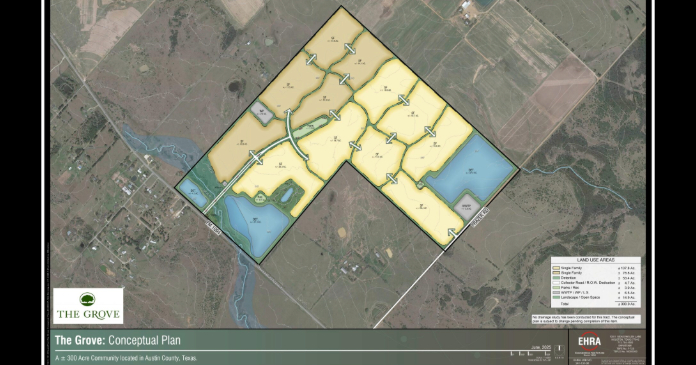The addition of 63,985 units last year propelled the nation’s largest apartment management services company to the number three spot in the National Multi Housing Council’s (NMHC) 2008 annual ranking of Top 50 management companies, based on the number of units managed as of January 1, 2008.
With the acquisition of two regional management companies this year and a number of new management contracts already under its belt this year, Riverstone Residential likely will overtake Pinnacle, the 2008 Top 50 second-place holder, and appears poised to move AIMCO out of the top spot. Mega-REIT AIMCO has shared the number one position alternately for a number of years with Equity Residential, which ranked fourth place in the latest NMHC rankings.
“We have seen, in the most recent Top 50 surveys, consolidation in the third-party management ranks taking place most predominantly among those firms that are privately held,” said NMHC President Doug Bibby. Private companies that recently add thousands of units to their portfolios include Greystar, JPI, and, of course, Riverstone Residential, whose growth, NMHC says, is “in a class by itself.”
Some industry watchers see the consolidation activity in the management sector as a harbinger of change, speculating that, when the dust settles, the majority of the nation’s rental inventory will be managed by only a few.
But Bibby thinks it is still too early to tell what kind of a trend the industry is seeing, pointing out that, “Every time someone has made a prediction about consolidation, it’s been proved wrong.” So, with no crystal ball in sight, the industry will have to wait and see what happens over the next couple of years.
“We are seeing the emergence of several powerful national property managers. These firms are using economies of scale to overcome thin margins and to refute the conventional wisdom about property management being a low-growth area. Not only are they surpassing investor and client expectations, they also are raising the customer service benchmark for the industry. By leveraging their national platforms to recruit, develop and retain the best available talent, they are bringing a new level of professionalism to the sector and transforming the renter’s experience,” he said.
Meanwhile, the property management sector remains extremely fragmented. Most of the country’s 15 million or 16 million apartments are managed by companies with a local and regional presence. Only several million are managed by the top 50 management firms.
Consider the source
It’s not surprising that the nation’s largest independently owned apartment management firm sprang from Trammell Crow Residential (TRC), which has a long history of propagating new apartment companies, especially during the 1990s.
Avalon Properties, which merged with Bay Apartment Communities to become the luxury REIT AvalonBay in 1998, was TCR’s Northeast portfolio until 1993. TCR’s Southeast and South Central portfolios went public in 1994 to become Gables Residential, and its West Coast portfolio became BRE Properties Trust in 1997. The following year, Gables acquired TCR Southeast for $600 million in cash, securities and assumed debt.
TCRS was a dominant player in the apartment management sector during that decade and, even with the apartment REIT spin-offs, managed to rank among the NMHC’s Top 10 apartment managers. But by 2005, apartment development, had slowed significantly, as the condo wave precipitated huge spikes in land and construction costs.
With limited delivery of new rental, the 55,000-unit portfolio managed by TCRS was approximately 50 percent fee-managed and 50 percent owned. Meanwhile, reduced fees in a competitive marketplace, and increasing liability for third-party managers, had shaved the margins and made the business more labor-intensive.
The TCR management board decided in June 2005 to increase its focus on the company’s development and construction activities and sell the management company.
Danner and Freeland were two of the chief operating officers at the time. Freeland had taken over the company’s Mid-Atlantic, Northeast and South Florida regions in 1997. Danner, who joined TCRS in 1996 to re-start the company’s Southeast region after it became Gables Residential in 1994, was COO of the South Central region.
The duo presented a business plan and an exit strategy in August. “We decided we would buy the property management business with the hopes of keeping strong executive and senior leadership teams together,”
said Freeland. “We negotiated the business agreement, talked to our clients, worked with all our associates and, by January 1, 2006, Riverstone Residential Group was born.”
Under the terms of the agreement, the new firm would continue to manage TCR-owned properties. The co-CEO’s first order of business was to unify TCRS’ five regional groups that operated almost autonomously, providing few economies of scale.
“There was a lot of consolidation going on in our industry at the time. Morgan Stanley bought AMLI and ING acquired Gables. We were concerned that if more of our institutional clients were to buy management companies, it would seriously impact our business and ability to grow,” states Freeland.
The Regis Group approached Freeland and Danner and offered to make Riverstone Residential its platform for a national management company and provide the capital and expertise to achieve strong strategic growth. The Regis Group is one of the largest privately owned property investment companies in the UK today. Formed more than half a century ago, the group has focused chiefly on investment opportunities in the residential sector.
During its first 25 years, the Regis Group was focused largely on the highly profitable regulated tenancy market, a type of rent control that allows for renter succession. Nicholas and Peter Gould took over the family firm in 1986 and quickly diversified into property development, with new projects ranging from simple conversions to large-scale, new-build plans.
The Goulds’ specialty has been their ability to identify markets before they develop. This led to the creation of one of the UK’s largest ground rent portfolios. The Goulds had the foresight to assemble huge chunks of repossessed properties during the 1990’s recession and continued to grow on the management side, forming a residential property management arm in 1998 that ventured into the residential, commercial, insurance and social services sectors. By the time Regis sold that division in 2005, it had become the largest such provider in the UK.
The terms of the sale of Regis’ property services division included a five-year, non-compete stipulation, so the company set its sights on the United States and formed Consolidated American Services (CAS), aptly named since its sole stated objective is to become the premier real estate services firm in the U.S. through consolidation of the property services sector.
Freeland and Danner sold controlling interest in Riverstone Residential to The Regis Group on July 1, 2006 and retained ownership interests and significant operating positions in the company. Backed by CAS, they set out to buck the conventional wisdom that property management is not a growth sector.
In April 2007, they gained 23,000 units in California, Arizona and Hawaii with the acquisition of Stratus Real Estate. Four months later, CAS and Riverstone Residential bought Denver-based Omni Apartment Communities, which managed approximately 13,000 units in Colorado.
Riverstone Residential acquired Las Vegas-based Realty Management, Inc., early this year, picking up 21,000 units in Nevada, Arizona and Texas. In April, they added 34,000 units in the Northwest through the acquisition of Seattle-based HSC Real Estate.
Strong business growth and new contracts also are contributing significant portfolio additions, as well. In July, Riverstone Residential was awarded contracts for 2,372 units from various clients in eight states, bringing the company’s managed portfolio to more than 192,000 units.
The need to be large
According to Freeland, a company must achieve a certain size before it can realize economies and efficiencies. She shares this view with visionary Chicago real estate entrepreneur Sam Zell, who wholeheartedly believes in the value of market dominance — hence the need to be large and grow. Zell is the founding force behind Equity Residential, which became one of the nation’s largest REITs with the
$1 billion takeover of Wellsford Residential Property Trust in 1997.
“In our case, our size provides significant advantages,” Freeland said. “It allows us to create a national backbone of resources. We’ve been able to add specialists in areas like information systems, accounting, risk and treasury, accounts payable, marketing and education, to provide support to our teams across the country.
“With the support of these national resources, our regional teams and onsite associates are better able to concentrate on the needs of our residents, clients, and properties. On the other hand, with offices in over 30 locations across the country, we have the presence to clearly understand local market knowledge. In essence, while we are national in practice, we are local in presence,” Freeland added.
To share best practices and stay ahead of the latest trends, the Riverstone Residential executives meet every six to eight weeks.
“Again, our scope and broad market reach provide distinct advantages.
We take a good look at what is happening, both within our portfolio and within our different markets. We are able to tweak and expand strong ideas and practices, and implement them throughout our company,” Freeland said.
Riverstone Residential’s clients also have the advantage of the other services CAS now offers. These include financial and insurance services, renovation construction and operational efficiencies like streamlined purchasing and energy procurement.
“The goal of CAS and Riverstone is to provide value to our clients.
As part of the CAS organization, we are able to give our clients access to a valuable network. The organization offers vendors or service companies that can deliver greater efficiency, provide beneficial services and ensure important cost savings,” adds Freeland.
CAS’ newest service is Riverstone Client Services and Business Development, a new division headed by Terry Danner. “Terry and his group will be focused on new business and keeping in touch with current clients to identify what items need to be addressed,” said Freeland.
Another new division within CAS is Purchasing/Ancillary Services.
This group offers purchasing services to properties for everything from carpet, paint and appliances to office supplies, and passes on the savings benefit of bulk buying to the property owners. Compass Capital Services is the capital improvement and renovations group within the ancillary services division and Resident Screening Services provides credit and collection services.
“The client wins because they have fewer expenses, and the onsite teams can focus on activities that add value to the property. We also gain quality control if it goes through our purchasing department,” said Freeland.
Boston-based Recap Advisors, which joined the CAS fold in April 2007, is active in the finance, restructuring, and asset management of multifamily residential properties. Headed by CEO David Smith and President Todd Trehubenko, Recap recently expanded into condo loan asset management, an area that could provide opportunities for Riverstone Residential to help convert unsold condos into apartments.
“We have diversified resources to provide Recap associates with property data, including physical inspections and market expertise on rents and expenses. We have helped them develop various approaches to market, lease, or reposition the properties they are working on,” said Freeland.
Being the flagship property management platform for a property services firm also helps Riverstone Residential meet the ever- increasing expectations of the company’s predominantly echo boomer renter pool. During these challenging economic times, people likely will remain in their apartments longer.
“Many people think we are not yet in a recession, but public spending is down and the dollar is not buying as much at the grocery store or the gas pump,” said Freeland.
She thinks a number of people who were saving to buy a home will put that decision on hold. “Home prices, which escalated dramatically in many parts of the country, are falling and many would-be buyers are hesitant to become homeowners today. Because of this, people will stay in their apartments longer, and we’ll see even greater emphasis placed on quality customer services.”
With fewer renters leaving to buy homes, it is a great time to manage apartments. However, Freeland says the current economy does present some challenges for property management. “Many developers are reducing their pipelines or delaying construction starts. This is impacting our current lease-up business. However, we know this business will be back and we continue to provide market data to our clients so they have knowledge about the areas,” she said.
Talent show
Attracting and retaining top talent is another area where size pays off, says Freeland. “People want to be involved with a company that will allow them to continue to grow. Associates do not want to have to worry about their job if a property is sold. Because we have a large presence in markets nationwide, we can offer them increased job security and opportunities. This is a tremendous advantage for our recruiting efforts.”
As Riverstone Residential acquired companies in markets across the country, many of those companies’ principals remained for a period of time to help with the transition. “Most clients heard the news about a change in management to Riverstone and were hesitant until they understood what it meant for their properties; more resources, better education and the same onsite associates and regional managers they knew and trusted. We take great care to ensure that the transition and impact on customers, residents and associates alike is as smooth as possible. And because of our size, there are great opportunities for promotions,” said Freeland.
Freeland strongly believes in promoting from within the company. July alone saw about a dozen senior level promotions. “In regions where we’ve acquired a company and want to continue to grow, we have reached out if there is no one in place. We’ve just done that in Southern California, for example, where we hired Craig Rooney to be our new senior VP,” she said. Rooney, who has intimate knowledge of the Southern California apartment market, recently served as regional VP with Western National Group.
The Marriott model
While big has its benefits, quality is what’s most important to Riverstone Riverstone. It is about being the best and highest quality manager in every class of property and in every market, says Freeland. She believes the best brand to model in hospitality is Marriott, which, with its “spirit to serve” approach, aims for best- in-class service across its various accommodations, from luxury full- service resorts to more affordable lodging options.
“When you get off at a freeway exit and see four different versions of Marriott, you know you are going to get good solid service at all of them, but you also know that if you pay a higher night charge, you will get some extras. That’s our model. We manage very high-end high- rises, smaller garden communities in more rural areas, mid-rises, tax- credit and Section 8 properties. Our people recognize that we are providing a strong level of service, support and respect to every one of our residents, regardless of how much rent they are paying,” said Freeland.
Looking into the future
Riverstone Residential’s portfolio today comprises approximately 70 percent market-rate units, approximately 30 percent affordable units, and a very small percentage of senior and student residences. “Our goal is to continue to grow. Whether we stop at 300,000 or 400,000 units will depend a lot on the market. In terms of future acquisitions, we are looking for good, solid companies with leadership that can further enhance our organization. We are considering some options right now that could significantly increase our portfolio by year-end,” said Freeland.
The company is looking in 15 or 16 cities around the country where an acquisition would complement the organization’s strategic growth, including Boston, D.C., Raleigh, Atlanta and Miami. “We’re focused on making the right strategic buys, and those could include a senior, student or military component, with strong leadership to run the business,” she said.
At some point in the future, Freeland thinks the company may look at an investment vehicle. “It could be a public or private event or a large company that wants a full-service real estate company. It will depend on the market at the time. My father taught me that if you create a good solid product, company or service, you will have many options to decide what to do with it.
“While we want to continue to grow, our emphasis will always be on quality. Terry, Nick, Peter, Keith and I remind our associates that we are providing a home for hundreds of thousands of people at every stage of life. Whether the resident is a person just out of school, a married couple, or someone who lost a loved one and is moving in alone, we are creating communities and providing a place of shelter. Property management and the services that support it are not always easy businesses, but it is certainly rewarding to know you are providing homes for people.
“We also never lose sight of our goal to be the best. Our vision is to create a world class organization that adds value for our associates, our clients and our residents.”
















